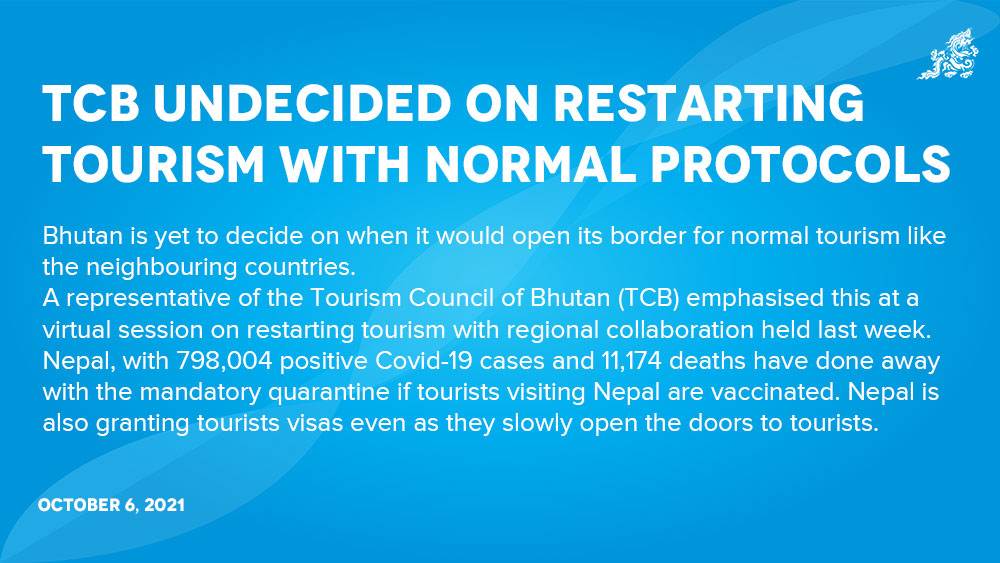Yangchen C Rinzin
Bhutan is yet to decide on when it would open its border for normal tourism like the neighbouring countries.
A representative of the Tourism Council of Bhutan (TCB) emphasised this at a virtual session on restarting tourism with regional collaboration held last week. Nepal, with 798,004 positive Covid-19 cases and 11,174 deaths have done away with the mandatory quarantine if tourists visiting Nepal are vaccinated. Nepal is also granting tourists visas even as they slowly open the doors to tourists.
According to the government’s directives, tourists wishing to visit the country will have to undergo quarantine on arrival, for 21 days if unvaccinated and 14 days if vaccinated, and pay for quarantine expenses.
Speaking on behalf of TCB, Chief Marketing Officer, Damcho Rinzin said that although there has been no decision made yet on restarting tourism with normal protocols, TCB has been working on how to give tourists a whole new experience once it restarts.
“TCB has developed safety guidelines that will cover safe travels for tourists starting from the airport, to the hotel, to sightseeing,” he said. “We’ve also come up with the standard operating procedure (SOP) for tourism service providers to operate in the new normal, and service providers are being trained.”
TCB will certify service providers to ensure health and safety protocols in light of the pandemic.
SOP looks into issuing clean and safe certificates to qualifying service providers. This will ensure safe and clean services are provided in compliance with health and safety protocols.
“We’re working on several other plans at the ground level right now to ensure a safe reopening.
But we’ll reopen for tourism fully, soon,” Damcho added. However, it was not revealed how soon.
Although tourists can visit with a mandatory quarantine, TCB is currently dealing with all tourist visa applications on a case by case basis to ensure that tourists are provided with good hotels while in quarantine.
Representatives at the meetings shared that there was a need for India, Nepal, and Bhutan to collaborate to restart tourism, especially in terms of coming up with general SOP and transit routes. Members shared that regional countries must come up with a common SOP, especially if a tourist visits multiple countries in the region.
A member added that they could come up with an SOP that would not only give confidence to tourists in terms of safety, but in the case of infection, also provide medical facilities in the respective country from the time of infection to recovery.
Honorary Secretary of the Indian Association of Tour Operators, Rajnish Kaishtha, said that 2022 would be a year of only “trial and travel” basis. Therefore, he said, it was important that countries prevent overpricing, as not many tourists would visit.
Damcho Rinzin said that the transit route is the biggest issue right now, given that limited flights are being operated. “This is one area we must work on at the sub-regional level and come together by revisiting the air transit agreement.”
Members also shared the idea of having a Covid-19 digital system among regional countries, and said Bhutan, Nepal, and India must take advantage of how tourism is opening globally to facilitate tourists at least by 2023.
Some members commented that the policymakers must make bold decisions on how to restart tourism, including bringing back businesses to sustain livelihoods because millions are affected due to the pandemic, and the virus is here to stay.
Only 28,000 tourists visited Bhutan in 2020, generating a revenue of USD 19 million, against 315,599 tourists in 2019. The tourism sector earned USD 225 million in 2019. It already recorded Nu 2 billion in non-performing loans (NPL) as of March 2020. The sector saw more than 50,737 hoteliers, tour operators, guides, and homestays affected because of the dependency on tourism for their livelihood.
The story has been edited with additional information


